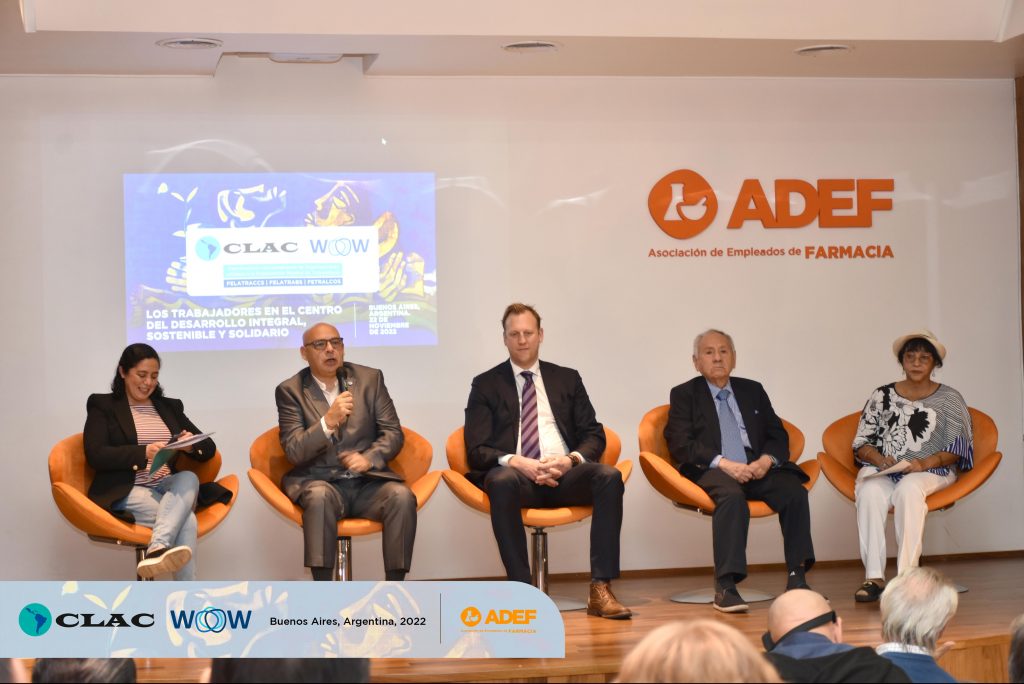Within the framework of its celebration, FELATRABS held two seminars and the 17th Congress at the headquarters of the Asociación Personal Jerárquico de Bancos Oficiales (APJBO). In addition, the previous days they participated in the meeting of the Latin American Coordination of Organizations affiliated to the international organization WOW (World Organization of Workers).
The Latin American Federation of Bank Workers (FELATRABS) celebrated its 50th anniversary this November 24 and 25 with two seminars, and the holding of the 17th Ordinary and Extraordinary Congress where they approved the memory, balance and reform of the Statute. During the seminars, on the one hand, they addressed the advancement of technologies in the financial sector and its impact on daily work; on the other, labour violence, gender violence and the role of unions.
In statements to Data Gremial, the General Secretary of FELATRABS Arturo Quiñoa explained that “in view of the change in economic models, we prioritize education for union leaders.” At the same time, he added: “We have to train ourselves, seeing the essential issues that are coming up for all of Latin America,” among them he mentioned “the reform of the provisional system and the health reform.” And he paraphrased: “We have to understand how the workers get stuck in these changes because they invite us when dinner is ready and we pay the fee.”
Regarding new technologies, Quiñoa recalled that at one point teleworking was being considered as a format for the future, however, as a result of the pandemic it was installed. “Now comes the work on project-basis,” warned the union leader.
“They are going to hire a series of multidisciplinary people and they are going to work in a company to do something specific. That ends and they leave”, said the leader of the Federation while stressing: “then those workers will have less ties to union activity, and they will also ignore the collective agreements. I mean, now it looks like science fiction, but science fiction has already arrived.”
In turn, the head of FELATRABS indicated that the “4.0 revolution is constantly mutating” and this implies a change in the financial sector. “Workers find it difficult because after the crisis that Europe has suffered in our sector, the banking sector, there will surely be mergers and take-overs, and they will see the issue of profitability.”
For Quiñoa, there is a new model where they need “fewer and fewer players.” This means adjustment, layoffs and cutbacks in the financial sphere. “Europe has not yet reacted to the crisis, but when they begin to adjust it will apply directly to Latin America,” said the union leader.
“The adjustment will be in the medium term,” remarked Quiñoa, who is also the General Secretary of the Asociación Personal Jerárquico de Bancos Oficiales (APJBO) of Argentina. As reported, they calculate that the adjustment may have an impact in mid-2023: And an attempt was made here when they enabled any business to provide financial services.
One of the main issues addressed by FELATRABS on its 50th anniversary was the direct impact of new technologies. Quiñoa gave as an example what happens in Ecuador where there are regions that no longer have physical banks, but instead have financial service chains that can be in a store or supermarket.
In short, “it is the disappearance of physical banking, but not because it disappears and becomes virtual, physical banking disappears and is transferred to other commercial units that have a cost well below what the cost of the financial service has”, the union leader explained. And he maintained: “they want to lower costs, earn more and pay less.”
FELATRABS proposals
Regarding the future lines of work of the FELATRABS, Quiñoa affirmed that they propose to be part of the discussion of the financial model. For the trade unionist, “the financial model is not in crisis, but if the problem of profitability is the global financial model, it is not logical that you adjust here.”
In this sense, he explained that “banks measure the profitability of each business unit, then if in each unit it could not recover profitability at a global level, where already 20% of the entity’s assets, nor if it could cover it with the business units from Europe it tries to adjust in Latin America, it tries to adjust in Asia”.
However, for the trade union leader “current life is that banks are highly profitable. They never lose, they win more and more.” Then, in this framework, Quiñoa stressed: “the workers cannot be conspired in stone, without giving the discussion of the central banks with the big banks.”
“We want to sit down to discuss in each of the countries and work on training union leaders, because if the leaders are trained they can convey to the affiliates the reality that is happening and the true reasons,” concluded Arturo Quiñoa.
During the celebration, members from all over Latin America participated, and FELATRABS also spoke in favour of the Argentine campaign “Salary Is No Profit” (“El Salario Es No Ganancia”), promoted by more than 50 unions.
International meeting
Between November 22 and 23, a meeting of the Latin American Coordination of Organizations affiliated with the World Organization of Workers (WOW) was held at the headquarters of the Association of Pharmacy Employees (ADEF), which was called “Workers in the centre of integral, sustainable and solidary development”.
During the two days they discussed the future of work, new technologies and the workers‘ movement. Members from all over Latin America participated: Mexico, Peru, Puerto Rico, Dominican Republic, Uruguay, Brazil, Paraguay, Curacao, and there were also representatives from Argentina.
Among the organizations nucleated in the WOW are: FELATRABS, the Latin American Federation of Social Communication Workers (FELATRACCS), and the Latin American Federation of Commerce and Services Workers (FETRALCOS).
Source: https://www.datagremial.com/informacion-general/la-federacion-latinoamericana-de-trabajadores-bancarios-cumplio-medio-siglo-tenemos-que-capacitarnos-ante-el-cambio-de-los-modelos-economicos–2022112812560 (original Spanish)





